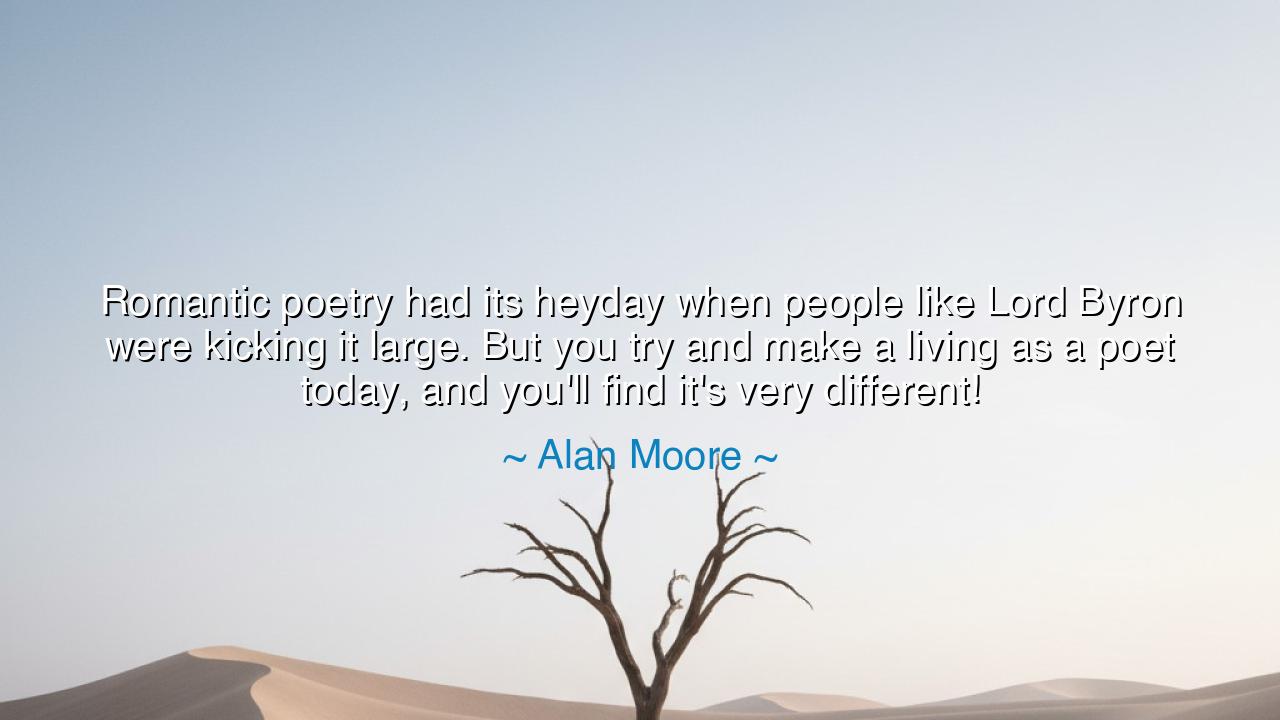
Romantic poetry had its heyday when people like Lord Byron were
Romantic poetry had its heyday when people like Lord Byron were kicking it large. But you try and make a living as a poet today, and you'll find it's very different!






“Romantic poetry had its heyday when people like Lord Byron were kicking it large. But you try and make a living as a poet today, and you’ll find it’s very different!” Thus speaks Alan Moore, with wit and irony, yet his words strike upon a truth both ancient and enduring: that the age of glory passes, and what once fed the soul and sustained the artist no longer carries the same weight in the marketplace of time. He names the splendor of Romantic poetry, its bold fires in the days of Byron, and sets it against the dimmer lights of the modern age, when such a path brings not riches but struggle.
The Romantic poets, of whom Byron was among the most radiant, sought to embody freedom, passion, and rebellion against the constraints of their world. Their verses thundered of love, death, nature, and the untamable spirit of humankind. Byron himself strode across Europe as both poet and legend, admired for his verse and notorious for his life. In that age, the poet was not merely a writer—he was a hero, a prophet, one whose words could stir nations. It was an era when art itself seemed to wield the power of a sword.
Yet Moore reminds us that such a time has faded. The heyday of poetry has passed, and though poets remain, they no longer command the cultural stage as once they did. The world has shifted; commerce prizes other skills, and attention drifts elsewhere. The poet of today may still speak truth, may still reveal beauty, but he does so in shadows, often with little reward save the satisfaction of having spoken. Thus the jest in Moore’s words hides a lament: the world no longer crowns its poets as kings.
But this is not the first time such change has come. In ancient Greece, Homer was revered, his epics sung across the seas. Yet centuries later, poets were pushed aside by philosophers and historians, their voices no longer the central fire of culture. In Rome, too, Ovid and Virgil knew glory, but in darker ages, poets were dismissed as dreamers while power flowed elsewhere. The fate of the poet has always risen and fallen with the tides of history, reflecting the hunger of each age for either beauty, wisdom, or utility.
Still, Moore’s words carry not only sorrow but a hidden challenge. For while the world may not reward poets with wealth, it still needs their vision. Romantic poetry reminds us that life without passion, beauty, and defiance becomes a barren desert. Even if the poet cannot “make a living” in silver, he makes a life in spirit, and the soul of the people is nourished by his song. Byron may not stride among us, but the hunger he stirred remains, waiting for new voices who dare to speak.
The lesson here is clear: do not measure the worth of art by its coin. Greatness is not born of sales or applause, but of the courage to speak beauty into a world that has forgotten it. If you are called to write, to paint, to compose—do not turn aside because the marketplace scorns you. Remember Byron, remember the heyday when poets shaped nations, and know that every age will again hunger for such voices, even if it does not yet know it.
Therefore, dear listener, take Alan Moore’s jest as both warning and encouragement. The path of the artist may not bring riches, but it brings riches of another kind: the power to inspire, to awaken, to preserve the fire of the human spirit against the cold winds of indifference. Seek not to “make a living” by art alone, but to make life itself artful. For the world may change its fashions, but the need for vision, passion, and beauty never dies. And in this eternal need lies the true wealth of the poet, greater than gold and more enduring than empire.






AAdministratorAdministrator
Welcome, honored guests. Please leave a comment, we will respond soon